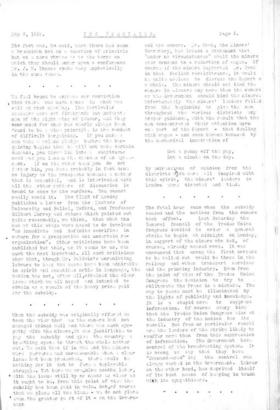We feel bound to oxp:-:nss our conviction that there was
much snse, in what 7/as said at that meetng. The particular speal:oril :lore not firetrnd but modolate men of the right wing. of Labour, and they contendod for what has nearly alv,ys been Tound to be !2 wis) princirio in the conduot of difficult bargaining. If you make a man take pledge before the brgaining begins that h:2 'il1 not make certain donnnds, you throi, him into n suspicious mood .,nd you ls3n th: cllances of an lgre ment. If on the other hand you do not fetter him, you have probably in fact done no injury to the prospects bocauso a matter that is essential, and is interlocked with all the other rlatters of discussion is bound to come to the surface. You cannot really avoid it. The TIYES of Londay published a letter from the Easters of University and Baliol, Oxford, and Professor Gilbert L:urray and others which pointed out quite reasonably, we think, that what the non at this stage were asked to do involved "an inmodiate and definite sacrifice in return for a prospective and uncertain reorganisation". Other criticisms have been published but this, as it seems to us, was much the most important. All such criticisms show that, though Yr. Baldwin's unremitting labours to keep the peace have been admirable in spirit and sometimes noble in language, the nation has not, after all,obtained the clear issue which we all hoped and intended to obtain as a result of the heavy price paid Zer the subsidy.










 Previous page
Previous page